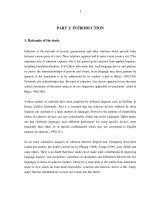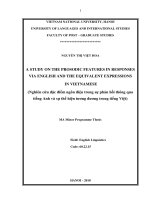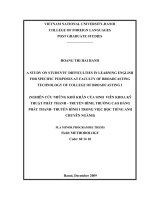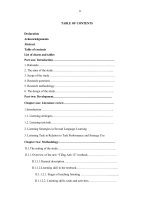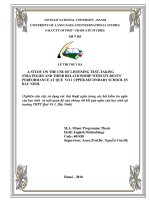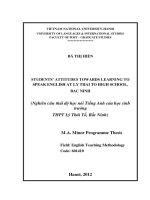study on students’ attitudes towards learning to speak English and their classroom speaking practices at Northern Water Resource College
Bạn đang xem bản rút gọn của tài liệu. Xem và tải ngay bản đầy đủ của tài liệu tại đây (157.33 KB, 7 trang )
A study on students’ attitudes towards learning
to speak English and their classroom speaking
practices at Northern Water Resource College
Nguyễn Thị Chúc Quỳnh
Trường Đại học Ngoại ngữ
Luận văn ThS. Chuyên ngành: English language teaching methodology
Mã số: 60 14 10
Người hướng dẫn: Dr. Mai Thi Loan
Năm bảo vệ: 2013
Keywords: Tiếng Anh; Phương pháp giảng dạy; Kỹ năng nói; Giao tiếp
Content
PART I: INTRODUCTION
1. Rationales
Nowadays, English is used for international communication more than any other languages
in the world. English is recognized as a lingua franca for communication across nations and
cultures and is the most desired second or foreign language in most countries in the world.
English is used as a second or foreign language in the workplace, international trade, global
media, tourism, education, aviation, business, technology and on diplomatic occasions. As a
result, the demand for speakers using English effectively is necessary in every country. Teaching
and learning English, except for the native language, is thus crucial for communicative purposes
to meet the demands of global economics and to cope with the growing local, national and
international demands for English skills.
In Vietnam, English is becoming more widely used in every field of life and it is an official
and compulsory foreign language which has been taught in most schools and universities all over
the country for nearly two decades now. People thus have a great concern about learning the
language. Many people are aware that English guarantees them good jobs if they are good at
English. Among the four language skills known as listening, speaking, reading and writing,
speaking skill is considered the most significant one that most learners of foreign languages need
to achieve. The crucial importance of speaking skill has been stated by many linguistic
researchers. For example, Ur (1996:120) states that of all four skills, speaking seems intuitively
the most important and people who know a language are referred to as speakers of that language,
as if speaking included all other skills of knowing that language. Richards (2008:19) also says:
“the mastery of speaking skills in English is a priority for many second and foreign language
learners. Learners consequently often evaluate their success in language learning as well as the
effectiveness of their English course on the basis of how well they feel they have improved in
their spoken language proficiency”. However, for many years, not much attention has been paid
to learners’ speaking competence in Vietnamese English classes and time for speaking practices
is limited for many reasons. Consequently, students have poor ability to speak English although
they have been learning English for a long time. They speak English badly even in English
speaking lessons. They often lack the confidence and feel confused when they are asked to speak
English. They regularly find it difficult to express their ideas in English and even some students
cannot speak anything but keep silent during speaking lessons. Among many different factors
that affect students’ learning to speak English in classroom, the attitude of the students has a very
important position.
This study has been conducted to investigate the attitudes of students at NWRC towards
learning to speak English and their classroom speaking practices in order to offer some
suggestions which might be useful for teachers and students here to develop English speaking
skills.
2. Aims of the study
This study aims at:
- finding out the attitudes of students at NWRC towards learning to speak English
- investigating the classroom speaking practices of the students at NWRC
- recommending some solutions for teachers at NWRC to improve their students’ speaking skill
based on the findings of the study
3. Research questions
1. What are the attitudes that students at NWRC hold towards learning to speak English?
2. How are their classroom speaking practices?
3. What should the teachers do to improve their students’ English speaking skill?
4. Scope of the study
The study was carried out at NWRC with the participation of 100 first-year students to find
out the attitudes of students towards learning to speak English and their classroom speaking
practices. Based on the findings, some suggestions were given to the teachers to help them
improve their students’ speaking skills.
5. Significance of the study
The result of the study is believed to help teachers at NWRC understand more about the
students’ attitudes towards learning to speak English and their expectations of the teachers’
speaking lessons so that the teachers have suitable methods to improve their students’ speaking
skills and encourage students to practise speaking English in classroom.
6. Methodology of the study
To conduct this study, both quantitative and qualitative methods were used, involving the
survey questionnaires and classroom observations. The survey questionnaires were delivered to
100 first-year students to investigate their attitudes towards learning to speak English. Besides,
class observations were conducted to see how and what students often did during English
speaking classes. Classroom observations helped the researcher survey students’ practices in real
situations so that the reliability and validity of the data collected for this study could be achieved.
The data collected from the questionnaires and the result of class observations will be analyzed
and generalized with a hope for offering some suggestions for the teachers at NWRC to improve
speaking competence for their students.
7. Design of the study:
This thesis includes three main parts as follows:
Part I: Introduction
This part includes the rationales, the aims, the research questions, the scope, the
significance, the methodology and the design of the study.
Part II: Development
This part consists of three chapters:
Chapter 1: Literature review
In this chapter, the theoretical background of the study is introduced. It focuses on three
main points: theory of attitudes, speaking skills and some techniques as well as activities that are
often used in speaking lessons.
Chapter 2: Research methodology.
This chapter starts with the description of the setting and the participants of the study. It also
presents how data were collected through the research methods and research procedures.
Chapter 3: Data analysis and Discussions
In this chapter, the data collected will be analyzed and discussed. From this, students’
attitudes toward learning to speak English will be found and their classroom practices will be
mentioned as well.
Part III: Conclusion and Recommendations
This chapter gives a short summary of findings and draws out some suggestions that are
good for teachers and students in teaching and learning to speak English. Beside that, some
recommendations for further researches are also discussed in this chapter.
REFERENCES
Foreign authors
1. Abidin, M. J. Z., Pour-Mohammadi, M., and Alzwari, H. (2012). EFL students’ attitudes
towards learning English language: the case of Libyan secondary school students, Asian
Social Science. 8 (2).
2. Bailey, K.M (2005) Practical English Language Teaching: Speaking, McGraw-Hill
ESL/ELT
3. Bailey, K.M and Savage, L. (1995) New Ways in Teaching Speaking
4. Baker, C. (1992) Attitudes and Language, Great Britain: Multilingual Matters Ltd
5. Brown, D.H (1994) Principles of Language Learning and Teaching, Englewood Cliffs:
Prentice Hall Regent
6. Bygate, M. (1987). Speaking. Oxford: OUP.
7. Chaney, A.L., and T.L. Burk. (1998) Teaching Oral Communication in Grades K-8.
Boston: Allyn&Bacon
8. Doff, A. (1988) Teaching English: A training course for teachers, Cambridge: University
Press
9. Eagly AE, Chaiken S (1993). The psychology of attitudes, Orlando, FL: Harcourt Brace
10. Gardner, R. and W. Lambert (1972) Attitudes and Motivation in Second-Language
Learning. Rowley, Ma.: Newbury House.
11. Gardner, R.C. (1985) Social Psychology and Second Language Learning: The Role of
Attitudes and Motivation, London: Edwards Arnold (Publishers) Ltd.
12. Harmer, J. (1998) How to teach English, Addison Wesley Longman Limited
13. Karahan, F. (2007) Language attitudes of Turkish students towards the English language
and its use in Turkish context, Journal of Arts and Sciences Sayi:7, Mayis 2007
14. Mackey, W.F. (1965). Language Teaching Analysis, London and Harlow, Longman.
15. McLeod, S. A. (2009). Attitudes and Behavior - Simply Psychology. Retrieved from
16. Melhim, A. and Rahman, A. (2009) Attitudes of Jordanian college students towards
learning English as a foreign language, College Student Journal; Jun 2009; 43, 2; ProQuest
Central, pg. 682
17. Noursi, O.A. (2013) Attitude towards Learning English: The case of the UAE
Technological High School, Educational Research (ISSN: 2141-5161). Vol. 4(1), 21-30
18. Nunan, D. (1991). Language Teaching Methodology, Prentice Hall International Ltd.
19. Porkaew, K. (2004) The role of attitude and motivation in Second and Foreign Language
Learning, Language Institute Journal. Volume 2, 69-76
20. Reid, N. (2003) Getting Started in Pedagogical Research in the Physical Sciences, LTSN
Physical Sciences Centre, University of Hull, Hull. [Online] Available:
/>ogic_research_in_the_physical_sciences_aug_2004.pdf (August 9, 2011)
21. Richard-Amato, P. A. (1988) Making it happen: Interaction in the second language
classroom: From theory to practice. New York: Longman
22. Richards. J.C (2008) Teaching listening and Speaking: From the theory to practice,
SEAMEO Regional Language Centre
23. Richards, J.C and Renandya, W.A. (2002) Methodology in Language Teaching: An
Anthology of current Practice, Cambridge: Cambridge University Press
24. Richards, J.C. & Rodgers, T. (1986) Approaches and methods in language teaching: A
description and analysis. Cambridge: Cambridge University Press.
25. Tamimi, A.A. and Shuib, M. (2009) Motivation and Attitudes Towards Learning English: A
Study Of Petroleum Engineering Undergraduates At Hadhramout University Of Sciences
And Technology, GEMA Online Journal of Language Studies. Volume 9(2) 2009
26. Tsiplakides & Keramida. (2010) Promoting Positive Attitudes in ESL/EFL Classes, The
Internet TESL Journal, Vol. XVI, No. 1, January 2010
27. Ur, P. (1996), A Course in Language Teaching, Cambridge: Cambridge University Press
Vietnamese Author
1. Nguyễn Thị Chung (2010) Teachers’ attitudes towards the use of computers in language
teaching at Hanam Teachers’s Training College, Unpublished MA Dissertation CFL-VNU
2. Nguyễn Thị Chúc Hà (2006), Students’ Attitudes towards English Grammar Learning at
Tran Nguyen Han Upper Secondary School, Unpublished MA Dissertation CFL-VNU
3. Nguyễn T.Thanh Hằng (2006) Teachers’ Attitude toward Applying CLT in Teaching
Vocabulary for Grade-10 Students at Nguyen Van Cu High School, Unpublished MA
Dissertation CFL-VNU
4. Bá Thị Hiền (2012) Students’ attitudes towards learning to speak English at Ly Thai To
High School, Bac Ninh, Unpublished MA Dissertation CFL-VNU
5. Trần Thị Huyền (2008) High school teachers’ perceptions and attitudes towards
Communicative language teaching to teaching grammar, Unpublished MA Dissertation
CFL-VNU
6. Nguyễn Thị Phương Lan (2010) An investigation into the attitudes of teachers and students
at the Hanoi college of industrial economics towards speaking activities in the textbook New
Headway Pre-Intermediate and some suggestions, Unpublished MA Dissertation CFL-VNU
7. Nguyễn Thị Thanh Loan (2006), Teachers’ Attitudes towards Grammar Teaching in the
light of Communicative Approach with the Course book New Headway Pre-Intermediate to
First-year Non-Major English Students at Hai Duong Medical Technical University,
Unpublished MA Dissertation CFL-VNU
8. Trần Thị Phương (2007) Students’ Attitude about the Role of Rote Learning in Vocabulary
Learning Strategies at Nguyen Sieu Upper Secondary School, Unpublished MA Dissertation
CFL-VNU
9. Hoàng Thị Bích Thủy (2008), Students' attitudes towards cooperative learning at Nghe An
training college and implications for teacher education programs, Unpublished MA
Dissertation CFL-VNU
10. Bế Thị Thu Trang (2007), An investigation into Viet Bac 11
th
grade students’ and teachers’
attitudes towards the application of pair work and group work in teaching and learning
speaking skills, Unpublished MA Dissertation CFL-VNU
11. Nguyễn Hạnh Tuyết (2009) An Investigation into Teachers’ and Students’ Attitudes
towards the Use of Visual Aids in Teaching and Learning Vocabulary at Le Quy Don Gifted
High School, Dien Bien, Unpublished MA Dissertation CFL-VNU
12. Trần Thị Vân (2010), Teachers and students’ attitudes towards the effectiveness of
teaching and learning vocabulary through translation activities: A survey research at Tran
Nhan Tong high school, Hanoi, Unpublished MA Dissertation CFL-VNU
13. /wiki/Attitude_(psychology)



